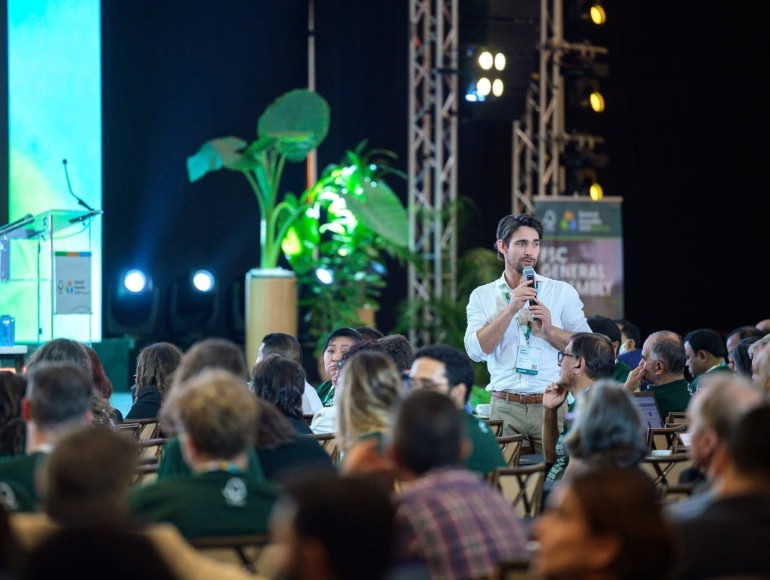

14.11.2025
A strong signal for the sustainability of tropical forests
Adopted by an overwhelming majority at the 2025 FSC General Assembly in Panama, Motion 45/2025 — “Moving Beyond Fixed Thresholds to Outcome-Based Conservation for Intact Forest Landscapes (IFLs)” — marks a major turning point in FSC’s approach to Intact Forest Landscapes (IFLs).

A long journey since Motions 65, 34, and 23
Since Motion 65 (2014), FSC has required that 80 % of IFL areas within certified concessions be set aside for conservation.
In both tropical regions and Canada, this rule led to untenable situations: some concessions would have had to place more than half of their area under protection, resulting in major economic losses and raising doubts about the environmental relevance of such frozen zones. As a result, several certificates covering hundreds of thousands of hectares under sustainable management were threatened, severely limiting FSC’s presence in these regions.
In response, Motion 34 (2017) called for regional impact assessments of IFL protection measures.
One of the key findings from these studies was that IFL areas located within FSC-certified management units represented only 0.6 % to 7 % of the total IFLs in the surrounding landscapes.
That motion was an important step for reflection and assessment rather than the imposition of new rules.
Motion 23 (2022) then opened the way for a full revision of the system.
Driven by the work conducted under the Focus Forest project, many actors — including ATIBT, which had championed this motion — advocated for a more contextualized, landscape-level approach integrating ecological, social, and economic realities.
Motion 45, proposed by Joeri Zwerts, seconded by Richard Donavan and Ernesto Marval Munoz and supported by WWF and ATIBT now brings this evolution to life: it establishes the foundation for adaptive and measurable management of ecological integrity, supported by scientific indicators and financial mechanisms.
What Motion 45 proposes
After ten years of often polarized debate, FSC is moving from a rigid, one-size-fits-all protection model to an approach based on measurable outcomes, contextual flexibility, and economic viability.
Motion 45 calls for:
Why this decision matters for tropical forests
For Congo Basin forests, this evolution is vital.
Under the previous model, some certified operators were forced to abandon certification, unable to remain economically viable while complying with the imposed thresholds.
Motion 45 restores credibility to FSC certification — creating a framework that is ambitious yet realistic, reconciling conservation and sustainable forest management.
It firmly anchors intact forest protection in a logic of measurable results rather than uniform prescriptions.
This is a crucial step forward for tropical forests, where overly strict conservation rules had previously threatened the viability of FSC certification.
Reactions and perspectives
“I wasn’t an early supporter of Motion 45/2025 — but I am now.
After ten years of debate on Intact Forests (IFLs), FSC has finally taken a pragmatic step: moving from rigid protection rules to measurable results.
Conservation must remain ambitious, but it also has to be viable.”
— Vincent Istace, Olam Agri
“Our goal was to move FSC’s approach from rigid protection thresholds toward context-driven, adaptive management — improving conservation outcomes while keeping certification practical and fair.
Motion 45 helped FSC overcome a decade-long deadlock.”
— Joeri Zwerts, Utrecht University, author of the motion
For ATIBT and its members, this adoption is a collective success: it reflects years of advocacy for an approach that recognizes real on-the-ground efforts and restores tropical forests to the heart of the FSC system.
What’s next?
Implementation of Motion 45 will rely on pilot projects and scientific evaluation to define robust and transparent monitoring indicators.
This new framework will also need to be aligned with the outcomes of Motion 23/2022.
ATIBT, as a continuing member of the Focus Forest Advisory Group (FFAG), will remain closely involved in this process to ensure that the voice of tropical forest operators continues to be heard.